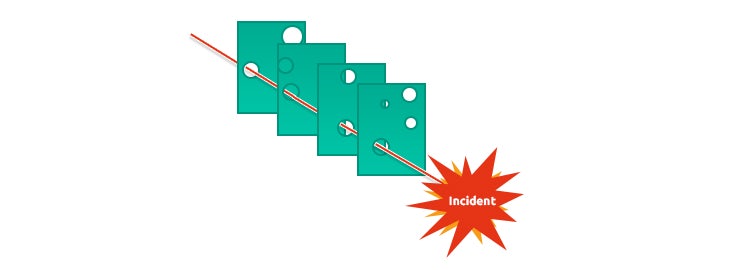To ensure process safety in a factory, protective layers are used; risk-reducing measures. These protective layers can be related to people, the process, or the plant (and machinery). The greater the risk, the more protective layers are needed to reach a maximum tolerable risk.
Ideally, each of the protective layers would function 100% effectively. Unfortunately, in practice, the protective layers ensuring process safety often do not work perfectly for various reasons. For example, procedures are not always followed, parts can be defective, corrosion occurs, and design errors are made. Every department, including the maintenance department, must adhere to a budget, which doesn’t always lead to the desired outcome. Budget cuts can mean the maintenance department loses personnel or less is invested in safety instruments that are not strictly required. This creates “gaps” in the protective layers. While there are enough other layers to prevent dangerous situations, the risk significantly increases when maintenance work is cut back.
The reasoning stems from the fact that the longer a plant is shut down, the higher the costs. More inspections and maintenance lead to longer downtime. Cutting back on maintenance and inspections benefits the plant financially. However, process safety will suffer. Although each staff member in a factory has a role in ensuring process safety, management is ultimately responsible for the safety of the personnel and for preventing environmental and financial impacts from malfunctions. So far, human error is the most common cause of system failures, with significant consequences. For example, “passing the buck” can lead to misunderstandings, causing certain important tasks to be left undone or incorrectly completed.
Read also: How company culture influences worker safety »
The four eyes principle, where at least two people must sign off on the approval of a machine (part) or monitoring function, is designed to minimize this type of human error. Independent companies with highly certified Functional Safety engineers and consultants, such as Istec International, are often hired to contribute to the process safety of a plant. They work with the factory’s maintenance and safety teams to ensure that the protective layers designed to prevent/reduce hazards and risks function properly and are correctly monitored.

